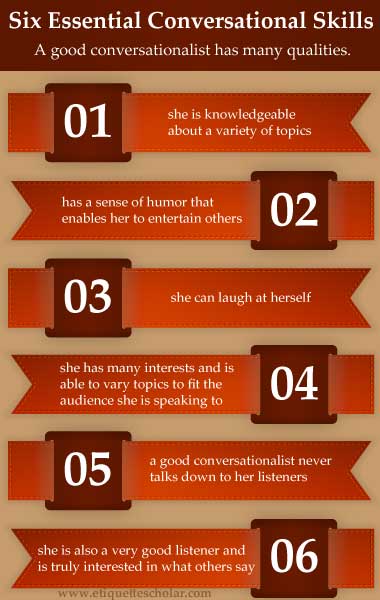Talking Business at the Dinner Table
Not discussing business at a business lunch is not necessarily congenial; it is a waste of time and may put off a busy, organized person.
when to discuss business
Generally, the host initiates the business discussion. Business, if not urgent, is often discussed toward the end of the meal or over coffee. Don't wait too long, though, or you won't have time to accomplish your objective.
- If you are the junior member of a party, don't dominate the discussion, but make comments and ask questions.
- When the table isn't involved in a general discussion, be a good conversationalist with the people seated on either side of you.
- If you are the host, it's your job to steer the conversation, to suggest topics for discussion, and to make sure that everyone at the table is given the opportunity to be part of the general conversation.

essential conversational skills
A good conversationalist has many qualities.
- she is knowledgeable about a variety of topics
- has a sense of humor that enables her to entertain others
- she can laugh at herself
- she has many interests and is able to vary conversation topics to fit the person or audience she is speaking to
- a good conversationalist never talks down to her listeners
- she is also a very good listener and is truly interested in what others have to say
Listening is probably the most important quality. The ability to listen to others even when we're bored or uninterested is the greatest skill we can develop. Listen attentively to all information. It will amaze you how many times it will be information you will need in the future.
Being able to talk about a variety of topics, being sensitive to others, having an assortment of interests, and carefully listening to what others are saying and are interested in will enable you to come up with many appropriate dinner table conversation topics.
knowing your audience
Consider your guests, clients, or audience.
- If you're discussing business over dinner with colleagues, then you may need to make small talk and discuss trivial matters for about a half an hour before business dominates the remainder of the conversation.
- If business is the reason for the hour long lunch, then stick to business.
- The conversations at dinner parties in people's homes and at restaurants vary widely, depending upon the nature of the guests and the reason for the dinner.
starting a conversation
- One good place to start is to think of common interests.
- If the other guests are people you see occasionally or associate with regularly, you can ask about recent developments in their lives or about what they've been doing since you last spoke.
- If you're going to be meeting many people at the dinner for the first time, get ready to make small talk.
small talk subjects
Small talk can be a life saver in many situations. It fills the voids in conversations, helps ease tense moments, sets others at ease, and helps us become acquainted with others. There are two ways to make initiating small talk a little easier.
- The first is to be well-informed, as all good conversationalists are. This means being able to discuss topics such as current best-selling books, news events, famous people, fitness crazes, medical and technological advances, travel, and sports. These are all appropriate small talk subjects.
- The second way to ease into small talk is by asking others about themselves, their family, work, or hobby. If you know one of your guests or the host is particularly knowledgeable about wines or has wines as a hobby, you might steer conversation to that area.
conversation stoppers
Asking a person generally about himself is acceptable. However, asking very personal or intimate questions is off-limits. Do not ask about:
- religious beliefs
- financial situation
- terminal illness or any illness
- details about a divorce or an affair
- someone's weight, height, shoe size, age or mental health.
Exceptions are people who are best friends or who are absolutely comfortable discussing these subjects with one another.
Also avoid:
- harmful gossip; and
- telling racial, ethnic, and sexually oriented jokes.
You never know who's going to be offended by them even if they don't admit it or show it. Avoid issues that have been overly discussed and are no longer interesting to the majority of people.
Leave money matters at home.
Don't bring up strongly debatable and controversial issues if you don't know how the other person feels about them.

